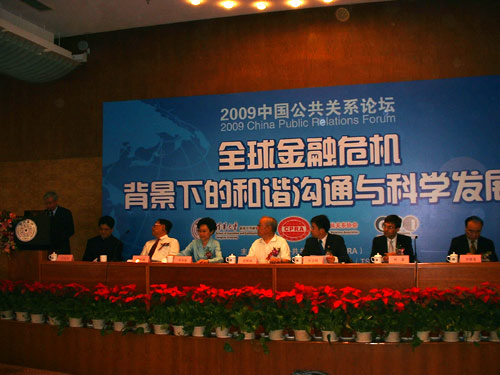By Wang Zhiyong
China.org.cn staff reporter
Government officials received much flak for failing to adapt to changing demands for information from people in the media industry this past weekend at the 2009 Public Relations Forum.
|

|
| The 2009 Public Relations Forum opens at Tsinghua University in Beijing on June 14, 2009. [China.org.cn] |
Cao Jingxing, the famous program host from Phoenix Television, told his audience at Tsinghua University that his most insufferable experiences during his 10 years in journalism have been interviewing drab government officials to the point of being "hypnotized."
"Ten years ago, some Chinese officials preferred to give formal reports of their official duties, and it's boring. To avoid falling asleep, I had to pinch myself frequently," Cao revealed Sunday during a panel on Domestic and Foreign Media and Public Relations Practices in a Transmission Age.
Cao said domestic officials traditionally think of talking to media reporters as a one-way exchange of information instead of interactive communication. He divided officials into three categories based on how they responded during interviews.
Officials in the first category use the "traditional" method of safeguarding themselves and talking only about things they are willing to discuss, Cao said. In this group are some top-ranking officials in local governments who do not allow questions that weren't on the original question list.
Officials in the second category have an active attitude toward publicity only when they are advocating their achievements. "In their hearts, they are not as sincere as they show," Cao said. "Actually, they try everything to avoid a reporter's inquiry."
But as time goes by, Cao has seen changes among officials. Those in the third category are practical-minded and enterprising, Cao said. For them, media reporters are a way to communicate with the public.
"I noticed some officials sweating when I was interviewing them," Cao said. "I knew that they were experiencing a hard time in getting over the psychological difficulty. I knew it was hard for those officials."
Cao mentioned two officials who impressed him the most for their willingness to explain and discuss reform policies with reporters: Jia Zhibang, a former governor of Shaanxi Province who is now the Minister of Forestry, and Huang Qifan, deputy mayor of Chongqing Municipality.
Cao said that Jia told him a lot about Shaanxi's apple industry and, later as forestry minister, the reform of farm forestry ownership. He also noted Huang's willingness to provide a different voice when he offered ideas for mitigating the impacts of the possible financial crisis. Huang proposed that the government focus more on reviving enterprises instead of investing in infrastructure.
"Huang is one of the rare officials who enjoy good popularity among reporters," Cao said. "He is willing to talk about his thoughts and considerations with media reporters."
Two other speakers also criticized outmoded officials in a second panel discussion, Management of Government Press Releases and Media, at the forum.
"Some officials treat the media as tools and try to control reporters by hindering their work," said Chen Wenjun, deputy director?from the State Council Information Office. "Some even try to hide and distort the truth. Instead, their misbehaviors become news."
Citing China's fast-growing media industry, Dong Guanpeng, director of the Global Journalism Institute at Tsinghua University, called on the government to move past traditional ways of releasing information.
"China has 940 radio stations, more than 2,000 television stations, 1,900 newspapers and 9,000 magazines, as well as more than 300 million frequent Internet users," said Dong. "While the truth still is putting on its shoes, rumor already has taken off running. Government officials must take a new outlook on information releases."
The Public Relations Forum was co-sponsored by the China Public Relations Association (CPRA) and Tsinghua University's School of Journalism and Communication.
The two co-sponsors also announced at the forum the establishment of the Tsinghua-CPRA Training Center for Public Relations and Strategic Communication.
(China.org.cn June 15, 2009)